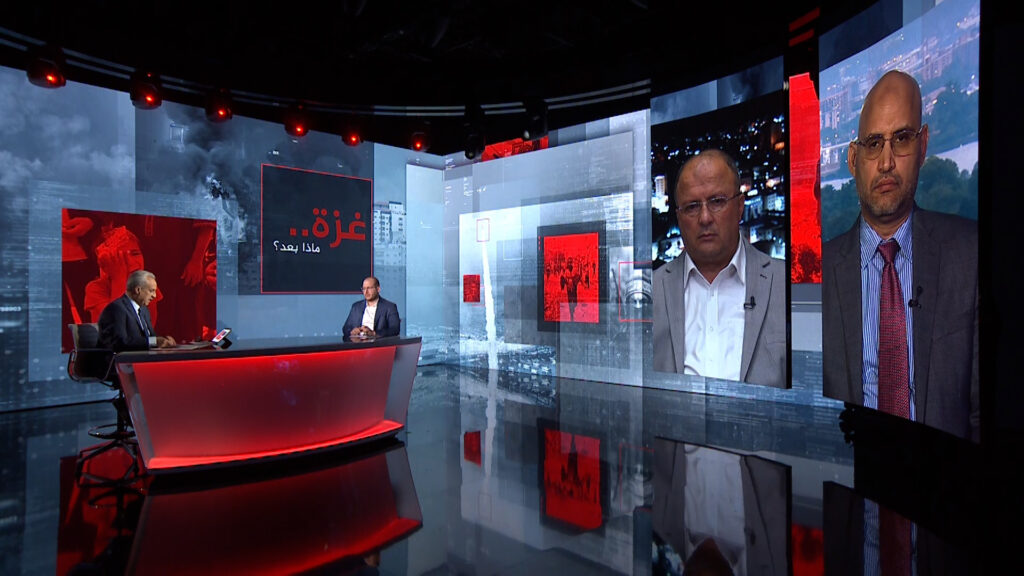5/23/2024–|Last updated: 5/23/202411:34 PM (Mecca time)
Political analysts’ opinions varied regarding expectations from the next round of negotiations between Israel and the Islamic Resistance Movement (Hamas) to conclude a prisoner exchange deal, after the Israeli negotiating team received a directive from the office of Prime Minister Benjamin Netanyahu to resume private communications.
In this context, Adel Shadid, a researcher specializing in Israeli affairs, says that the change in the Israeli position is primarily the result of internal developments and an American-Israeli discussion, stressing that most of Israeli society is repeating Ron Arad’s experience with the prisoners in Gaza.
During his talk on the program “Gaza… What Next?”, Shadid added that Netanyahu is under internal pressure, such as his military warning of strong attacks. Which means that he will be responsible for October 7, as well as the deadline set by War Council member Benny Gantz.
He pointed out that the majority of public opinion in Israel and its military elite are convinced that returning the prisoners by military force will lead to the final closure of the detainees’ file, but he added that things are at a standstill unless Tel Aviv agrees to a final cessation of the war.
According to Shadid, Netanyahu’s problem lies in how to maintain his government and not pass the exchange deal. He expects that he will try to please his extremist ministers Itamar Ben Gvir and Bezalel Smotrich, such as re-introducing the conscription law, canceling the disengagement law from the Jenin settlements, legitimizing settlement outposts, and annexing more lands.
In this case, the prisoner exchange deal may be passed – according to the expert on Israeli affairs – because it will give Ben Gvir and Smotrich what they want in the West Bank in exchange for the survival of his government coalition.
He pointed out that Israel is anticipating any decisions that the International Court of Justice might issue regarding the Gaza war, by announcing its army that the Rafah operation is continuing in a message of defiance, while acknowledging that Israel’s role and status globally is in continuous decline and erosion.
Regarding the Al-Qassam video related to the commander of the Southern Brigade of the Gaza Division, Assaf Hamami, Shadid believes that it is linked to the video of the Israeli female soldiers detained in the first days of the “Al-Aqsa Flood,” and it also represents an insult and a slap to the Israeli military leadership with the presence of the highest military officer detained by the resistance.
“A new negotiating situation”
In turn, researcher in political and strategic affairs, Saeed Ziad, agrees that a series of changes in Israel, such as the conferences of Gantz and Defense Minister Yoav Galant, the video of female soldiers, and American pressure, have led to renewed destruction through the negotiating path, which Netanyahu does not believe in.
Netanyahu is following a strategy of stalling – according to Ziad – and claiming that military pressure is what will return the prisoners, revealing that he is pushing towards a new negotiating situation in which the resistance will not accept to be the obstructing party, but it is currently in a better field situation and does not have internal disagreement or external pressure, which may push it to conditions.
Although he is not optimistic about the negotiating position after Netanyahu’s reversal of the last round’s understandings, Ziad believes that the Israeli Prime Minister is trying to calm and absorb the anger of the Israeli street after the video of the capture of Israeli female soldiers and the fragility of the Gaza contingent.
He stressed that the position of the resistance has not changed at a time when Israel’s ceiling is declining, considering the latter’s move to submit a negotiating proposal as a precedent, which implicitly represents a fall in its goal of eliminating Hamas and accepting its survival within the next day’s scenario and ruling out a scenario of chaos, according to him.
“No trust in Netanyahu”
For his part, Professor of Political Science and International Relations, Dr. Khalil Al-Anani, stressed that there is no trust in Netanyahu, who he said is manipulating the families of prisoners, the War Council, and the administration of US President Joe Biden, and exploiting the political dispute between the latter and Congress.
Al-Anani believes that it is difficult to expect a breakthrough or something new in the next round of negotiations after the “Paris 1,” “Paris 2,” Doha, and Cairo rounds, leading to an agreement stage on May 6, when Netanyahu turned against it and occupied the Rafah crossing and two-thirds of the Philadelphia axis.
He stressed that everyone is in a state of stagnation in the same place, in light of a trembling and confused American position affected by internal disputes in Israel.
He pointed out that there is boredom in the Israeli military establishment and disagreement with the political leadership due to the continuation of the Gaza war and its transformation into a quagmire and exhaustion.
He touched on the American internal political dispute and political intrigue, such as what he called “the Republican blackmail of Biden, who is suffering from a continuous decline in popularity and is affected by the student movement, as well as the understandings taking place between Washington and Riyadh within the framework of a normalization deal in the region.”
He concluded that there is “a sway from Republicans claiming that the Biden administration is abandoning Israel, with the aim of increasing their chances in the upcoming elections and obtaining a majority in Congress.”

